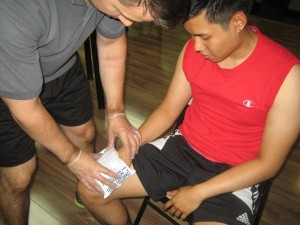Juvenile rheumatoid arthritis is also known as juvenile idiopathic arthritis and common among children ages under 16. Juvenile rheumatoid arthritis causes persistent swelling, joint pain and stiffness. Some children have symptoms only for months but others have symptoms for the rest of their lives.
Symptoms
- A child limps especially in the morning or after eating.
- There is swelling of the joints especially the larger joints like the knee
- The child becomes clumsy during morning or after eating.

Juvenile rheumatoid arthritis involves not only one joint but it can affect the whole body that will cause swelling of the lymph nodes, fever and rashes. Juvenile rheumatoid arthritis is categorized by symptoms that manifest and sometimes the symptoms disappear. If you want to learn how to manage this condition, click here.
Causes
A juvenile rheumatoid arthritis happens when the immune system of the body attacks its tissues and cells, and it is due to heredity and the environment. There are certain mutations of genes that make a person susceptible to environmental factors like a virus that may cause the disease.
Some conditions that can be caused by the juvenile rheumatoid arthritis include the following:
- Uveitis is a form of juvenile rheumatoid arthritis that causes eye inflammation and if this condition is not treated, glaucoma, cataract and even blindness can develop.
- Juvenile rheumatoid arthritis can cause interference in the child’s growth and development of the bones and some medications for rheumatoid arthritis can cause stunted growth.
Treatment and home remedies
- Perform regular exercises since they can promote both flexibility of the joints and strength of the muscles. Swimming is the best exercise.
- Children with juvenile rheumatoid arthritis suffer stiffness especially in the morning. Apply cold packs or hot packs or taking a hot bath or shower.
- Children suffering from juvenile rheumatoid arthritis have poor appetite and they are susceptible in developing weak bones also known as osteoporosis because of the disease, reducing physical activity and weight bearing as well as a healthy diet can be helpful in maintaining an appropriate body weight.
Diets for children suffering from rheumatoid arthritis have the main objective to prevent painful inflammation and supporting overall wellness of the child. Some dietary methods can prevent some arthritic symptoms. Fasting diets such as drinking juice or water only, vegan diets that are free from animal-derived products as well as elimination diets will restricts foods that causes the symptoms of rheumatoid arthritis.
Essential fats in the body like the omega-3 fatty acids can help lessen the inflammation caused by the rheumatoid arthritis. Some omega-3 fatty acids rich foods like fatty fish such as salmon, albacore tuna, lake trout, herring, mackerel and sardines. Some plant-based sources that are also rich in omega-3 fatty acids like flaxseed oil, ground flaxseed, canola oil and walnuts. Fruits, whole grains and vegetables can provide vitamins, minerals and antioxidants, which are disease fighting nutrients and dietary fiber for overall health.